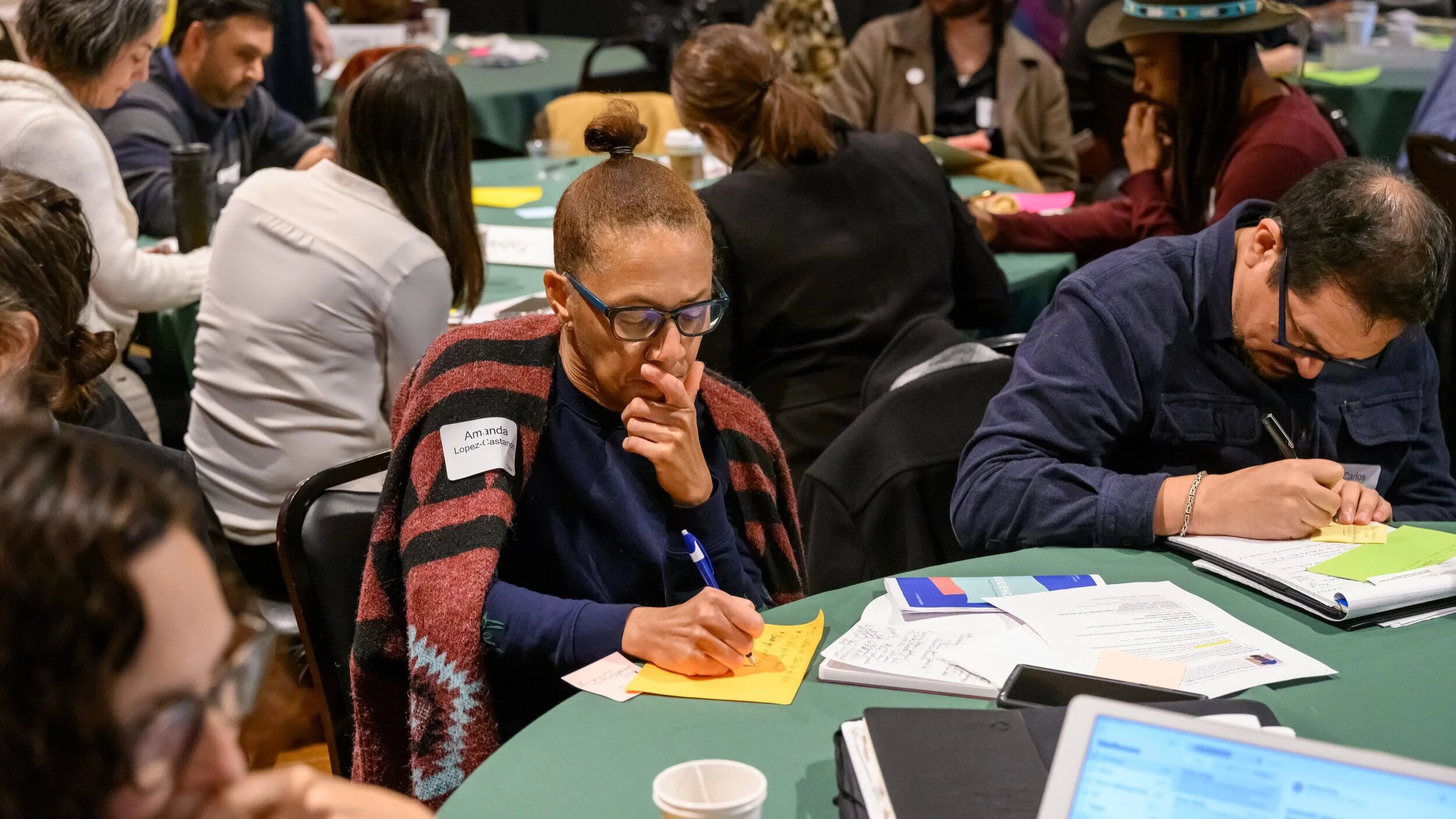Creating a Just and Democratic Economy
Photo by Sharon Chang. Notetaking happening at ED Summit tables
Central to the vision of Communities of Opportunity (COO) is a focus on supporting community-centered solutions and sustainable shifts in power to impact inequities in housing, health, and economic opportunity for communities in King County. Learning Community is one of COO’s strategic approaches to supporting longstanding community-based movements for equity. The COO Learning Community creates spaces for communities and organizations to share their work and gain additional skills across sectors to advance impact across the region.
Capacity building through Communities of Opportunity is financial support, training and skill-building, and the provision of spaces for convening and inspiration. All are important elements to working within the value commitments of COO and towards sustaining progress in COO’s four focus areas. Providing opportunities to come together to learn, strategize and envision what’s possible is important to supporting local capacity for innovative investment projects and ideas. Knowing that current systems do not work for all communities, and in our work to collectively re-design our systems so that all communities thrive, COO supports capacity building for transformative change. We want to create a local ecosystem for a more democratic economy – one that reflects local values and equitably manages the abundance of resources that our region holds.
Creating Just, Regenerative, and Democratic Economies
COO supported the People’s Economy Lab in bringing Aaron Tanaka, founder of the Boston Ujima Project and Director of the Center for Economic Democracy, to a dialogue with local grassroots organizations, philanthropy, small businesses, and government about developing economic models that are rooted within our communities for greater well-being. A community capital fund that uses a participatory budgeting process to make investments in local businesses, the Ujima Project operates using the principles of economic democracy -- that people and communities own and decide together how to manage collective needs (housing, food, energy, health, etc.) for a just and sustainable future for all. The Ujima project also serves as inspiration for developing and experimenting with investment tools that directly benefit local community and cooperative economic infrastructure.
The discussion with Aaron was designed to support the power of working across sector groups (philanthropy, capital, development, government and community-based groups and non-profits) and was intentionally inclusive of the local small business community. Business voices are often missing from discussions about barriers to equitable and sustainable economic and community development but are central to the conversation. These local leaders were able to talk about their perspectives and interactions with the economy and identify different capacities to catalyzing new and alternative governance, development and financial structures.
The convening highlighted specific limits within current structures, laws and regulations impacting how different entities have adapted to address current disparities within investment and capital funding approaches and the larger economic ecosystem. For example, the Boston Ujima Project can use a non-accredited investor approach for its community-centered economies project – allowing investors who don’t meet the wealth and income requirements to be an “accredited investor” to participate in capital financing projects for small businesses, real estate and infrastructure projects in Boston’s working-class communities of color. This is an investment structure that Washington state regulations currently prohibit, whereas a donor-advised funding approach may work to the same end goal of equitable, local and regenerative economic models here. As local communities continue in their own work to envision and experiment, understanding the local context and decision-making process of others is important to creating truly local, equitable economies, and to enhance national movements for democratic economies.
At the public evening session moderated by Deric Gruen for the People’s Economy Lab, Aaron was joined by local leaders, Trae Holiday of the Africatown Community Land Trust and Ming-Ming Tung-Edelman of the Refugee Artisan Initiative, who discussed their own work to shift resources toward community control and impact. The presentation and subsequent conversation included an emphasis and acknowledgement of the historic and continuing practices of racial and ethnic disenfranchisement and structural oppression that make community-driven capacity building critical to stabilizing the housing, business, and cultural institutions that create thriving, equitable communities. It is within this context that the intention for the day was formed -- to create time and space for the development of stronger social networks and the cross-pollination of ideas, projects and resource investments that can transform our current policies and practices for greater equity.
Connecting local leaders to innovative ideas and giving them the space for their own thinking, developing, collaborating, and prototyping are central components to building the capacity to sustainable change. In the next year, COO’s Learning Community will continue to develop such spaces for local community movements that are imagining and creating strategies and practices for equity. For inquiries about these future capacity building activities, or how to align with the work of COO’s Learning Community, contact program lead, Kalayaan Domingo (Kalayaan.Domingo@kingcounty.gov).

